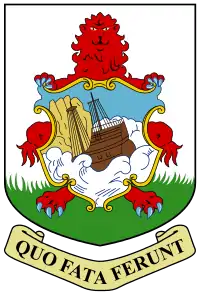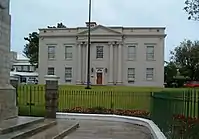Senate of Bermuda
The Senate of Bermuda is the upper house of the Parliament of Bermuda, the other being the House of Assembly. The Senate consists of eleven members appointed by the Governor for five-year terms — five Senators are nominated by the Premier, three by the Leader of the Opposition, and three appointed at the discretion of the Governor. Of the three appointed by the Governor, the Senate elects one to serve as the President, and another to serve as the Vice President.[1]
Senate of Bermuda | |
|---|---|
| 11th Modern Bermudian Parliament | |
 | |
| Type | |
| Type | of the Parliament of Bermuda |
| History | |
| Founded | 1 August 1620 (original unicameral house) 2 June 1968 (modern bicameral Parliament) |
| Leadership | |
John Rankin since December 2016 | |
Joan Dillas-Wright since 2017 | |
| Structure | |
| Seats | 11 Senators |
 | |
House political groups | Her Majesty's Government
Her Majesty's Loyal Opposition
|
| Meeting place | |
 | |
| The building housing the Senate and the Cabinet Offices. | |
 |
|---|
| This article is part of a series on the politics and government of Bermuda |
The Senate serves as a house of review and serves as a road-block to constitutional change — the constitution requires a 2/3 super-majority (i.e., 8 votes) for a constitutional amendment, requiring the support of both the government and opposition appointees.
The presiding officer of the Senate is the President of the Senate. Carol Bassett, who has been a Senator since 2003, was elected President in 2008, the first woman elected to the office.[2] She resigned the office in August 2017.[3]
Current members
The members of the Senate appointed in August 2017 were:[3]
The three Independents were:
- Joan Dillas-Wright
- James Jardine
- Michelle Simmons
Government/PLP nominees:
- Anthony Richardson
- Jason Hayward
- Kathy Simmons
- Crystal Caesar, and
- Vance Campbell.
Opposition/OBA nominees were:
- Nandi Outerbridge
- Nicholas Kempe, and
- Andrew Simons.
History
Bermuda's Parliament was created in 1620, and originally had one house, the House of Assembly. Political parties were not legal, and the role now performed by the Senate was originally performed by an appointed council, called the Governor's Council, or Privy Council. The council also performed the role that today belongs to the Cabinet (the Cabinet is composed of Ministers appointed from elected Members of Parliament from the House of Assembly). Historically, the Council, composed of members of Bermuda's wealthy merchant class, had been the true centre of power, rather than the elected House of Assembly, or the Governor despatched from overseas. During periods when the colony was without a Governor, the President of the Council would be Acting Governor. The balance of power began to shift away from the Council in the 19th century, when Bermuda assumed a new importance in Imperial security, and when the Governor became also the Commander-in-Chief of the naval establishment and military garrison.
In 1888, the Privy Council was split into an Executive Council, which later became the Cabinet, and a Legislative Council, which became the upper house of Parliament with appointed members.
In 1968, largely as a result of the civil rights movement, a new Constitution was introduced which made a number of changes to Bermuda's parliamentary system, making it more like the Westminster system. Political parties were legalised, and the system of a majority Government, from which a Premier was appointed and the Cabinet Ministers were drawn, and a minority opposition was adopted. Under the 1968 Constitution, the Legislative Council was replaced by the Senate. The system of suffrage, by which the members of the lower house were elected, and which had historically been limited to male landowners, was finally extended to all adults.
References
- travis.smith-simons (2016-03-03). "The Legislature". www.gov.bm. Retrieved 2018-12-11.
- Carol A.M. Bassett
- Carol Bassett Retires As Senate President